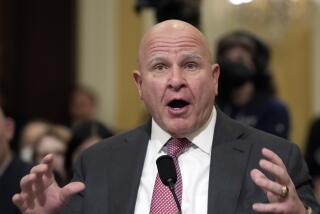No sure things for Obama advisors
WASHINGTON — The spoils go to the victors in politics, and usually a candidate’s campaign advisors are generously rewarded with top jobs in the government when an election is won.
The exception has been President Obama’s team of campaign foreign policy advisors, who have fared poorly in the new administration’s frantic job competition. The president, who ran as a liberal, has filled out his government with appointees more in the political center.
Obama had more than 300 foreign policy and military experts advising his campaign, including many original Iraq war opponents. Most held views somewhat to the left of those of his chief Democratic rival Hillary Rodham Clinton, whose team included more original Iraq war supporters.
But prospects for the Obama supporters dimmed when the new president gave control of the three biggest national security fiefdoms to Clinton as his new secretary of State, holdover Robert M. Gates as Defense secretary, and retired Marine Gen. James L. Jones Jr. as national security advisor.
Now, with the national security jobs nearly filled, the Clinton team is dominating the senior ranks of the State Department and the Pentagon. U.S. Ambassador to the United Nations Susan Rice has the highest-ranking job for an Obama team member, but the post has not been traditionally considered a Cabinet-level position.
Steven C. Clemons, a foreign policy specialist at the New America Foundation, a Washington think tank, described the job scramble as a game of musical chairs in which the Obama squad members have often found themselves without a chair.
“If they’re not running into Hillary people, they’re running into Republicans,” he said.
Many of the Obama advisors are frustrated and indignant that after months of helping the campaign, they were thanked in November and directed to apply for a job on Obama’s change.gov website -- along with hundreds of thousands of others.
One of the dismayed former advisors is Lawrence J. Korb, an assistant Defense secretary during the Reagan administration who answered the call to help the campaign a few weeks after it was formed in January 2007.
Korb, who works for the Democratic-affiliated think tank Center for American Progress, was co-leader of Obama’s military policy advisory team.
At one point after the campaign, Korb wrote a letter urging that some of the hardest-working members of his team be hired by the Obama administration. “I never heard back,” he said.
One of the most prominent members of the Obama national security team was Richard Danzig, a Navy secretary during the Clinton administration. He was a senior member of Obama’s advisor corps, traveled with Obama and was widely expected to be either Defense secretary or deputy Defense secretary.
Instead, Obama tapped Gates. Danzig said in an interview that he talked to officials about positions below that of deputy Defense secretary, but has passed for now.
“Some excellent other jobs were raised with me, so I don’t feel at all undervalued,” Danzig said. “But I decided as a personal matter not to go into the administration, at least for now.”
Another central figure on the Obama team was Brookings Institution analyst Ivo Daalder. A liberal on many foreign policy issues, Daalder oversaw nuclear proliferation issues.
But in the new administration, Daalder is expected to be named U.S. ambassador to NATO.
The responsibility for nonproliferation policy will go to two respected centrists -- Gary Samore, who will be in charge of proliferation issues at the National Security Council, and Robert J. Einhorn, who will be undersecretary of State for nonproliferation and international cooperation.
An important member of Obama’s Mideast team, former U.S. Ambassador to Israel and Egypt Daniel Kurtzer, has not yet taken an administration post. Kurtzer has sometimes been criticized by more conservative Israelis and staunch American supporters of Israel.
One Obama advisor on the Middle East who is in line for a job is Dennis Ross, a Mideast peace advisor in the Clinton and George H.W. Bush administrations. Ross, who has strong support from the center and right of the pro-Israel community in the United States, is expected to be named a high-level envoy to Iran.
White House spokesman Tommy Vietor disputed suggestions that Obama’s foreign policy team had not done well, noting the cases of Rice and Gregory Craig, the White House counsel; Denis McDonough, director of strategic communications for the National Security Council; and Mark Lippert, a foreign policy aide in Obama’s Senate staff who has been named chief of staff for the National Security Council.
A large number of trusted Obama foreign policy advisors “are now serving in critical foreign policy positions,” Vietor said.
Retired Marine Gen. Anthony C. Zinni, former chief of the Pentagon’s Central Command, went public last week with his complaints about the way he was treated by the administration.
Zinni, a former Bush administration envoy but an outspoken critic of the Iraq war, said he was told by Clinton, Jones and Vice President Joe Biden that he would be the new ambassador to Iraq.
But several days later, he said, Jones called him with news that the post would go instead to Christopher Hill, who had been handling North Korean nuclear negotiations for the Bush administration.
Zinni said Jones offered him the post of ambassador to Saudi Arabia, but he declined.
Brian Katulis, a former Obama advisor now at the Center for American Progress, noted that many of the foreign policy experts had waited anxiously through the eight years of the Bush administration in hopes that they could get back into government in a Democratic administration.
“People are really angst-ridden,” he said “If you could harness all the nervous anxiety that’s been generated by these foreign policy wannabes since last fall, we could be energy independent.”
--
More to Read
Get the L.A. Times Politics newsletter
Deeply reported insights into legislation, politics and policy from Sacramento, Washington and beyond. In your inbox three times per week.
You may occasionally receive promotional content from the Los Angeles Times.











